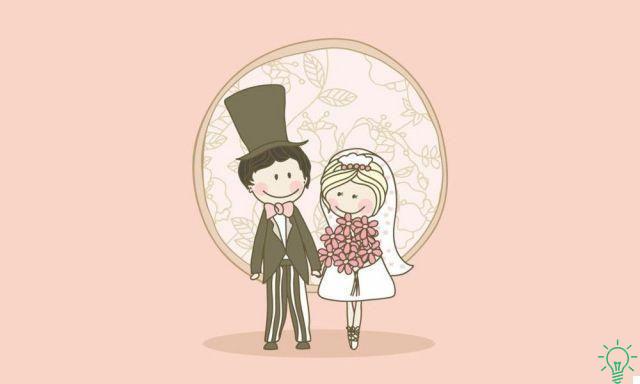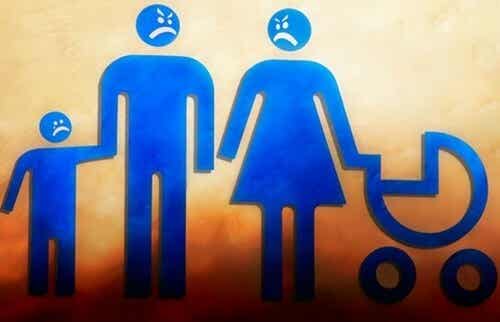The justifications we find when we suffer from emotional dependence do nothing but postpone an inevitable and necessary ending: reconciling ourselves with loneliness.

Last update: April 03, 2022
Affective dependence is characterized by an exaggerated, and almost morbid, attachment to a person. Usually, the partner is emphasized and idealized by believing that, without their existence, it is impossible to achieve happiness. Often a series of justifications are used that prolong the emotional dependence by making the person feel unable to separate from the partner.
Those who suffer from emotional dependence activate a series of mental patterns and have certain beliefs based on the fear of being alone and believe that, to solve their problems, they must rely on others. Alone he can't do anything, decisions have to be made by others.
With these beliefs, people with emotional addiction consider themselves weak.
They underestimate their abilities and need the help of others. The need to be with someone leads them to look for a person who can fill the emptiness and fears they have about loneliness.
The partner may disrespect, be unfaithful or treat them badly, however, even if they had the will to separate, they would not do it because they are afraid of being alone. They know that they are suffering, that they would like to change the direction of their life, yet, they do not change their attitude in an attempt to solve problems and improve the situation.
A cognitive dissonance is created between what one should do for one's own good and what one is actually doing.
You know you should end the relationship, but you stick together. In this context, there are excuses that only prolong the emotional dependence. A process of self-verbalization and self-deception is created that leads to remain tied to a person and to a relationship that has now become toxic.
What are the excuses that prolong emotional addiction?
There are as many excuses and justifications for not breaking up as there are people who suffer from emotional addiction. It was found that there are phrases and expressions that subjects immersed in this dynamic often repeat themselves and that they also use with others. They are the following:
It will certainly change
This is one of the most common excuses. To reject the idea of having a person next to us who is not for us, we tell ourselves that it will change. But why should this person change? If she hasn't done it in the past, why should she do it now?
Instead of turning away from reality, we should consider the idea that that person will probably never change. We have two options: accept it as it is - but if we're in pain, it's not a good choice - or break the relationship, even if it hurts us.
We must keep in mind that people are the way they are and unless they decide to change their behavior or change their way of being, they won't change by magic.
The fact is that I am in love, one of the excuses of emotional addiction
Generally, it is thought that love can legitimize any behavior. “Love wins over everything”, we often repeat to ourselves. Based on this idea, the person suffering from emotional addiction tends to accept any behavior of the partner. It doesn't matter if he's manipulating her or disrespecting her, putting up with certain behaviors is a show of love.
When we are well, everything is great
All couples have good times and bad times. However, it is necessary to understand if the bad moments exceed, in frequency and intensity, those in which the relationship seems to go well. If you notice that toxic discussions outweigh the good times, it's good to stop and ask yourself if it makes sense to still believe in the relationship.
What happens if I fail to end the relationship?
This is the perfect excuse every person suffering from emotional addiction uses to avoid ending a relationship. It is very similar to the one that the partner can change. The desire that things can change makes one live in the illusion that things will get better in the future.
You don't want to break off the relationship because you are afraid of not being able to live the future you dream of. If you analyze this position well, you will realize that it is nothing more than a fiction created by the mind to avoid a period of suffering.
If your partner hasn't changed or if things have been the same for years and you've tried everything… what do you think you can go wrong with? Maybe you are wrong now?
Now is not the right time to talk
The perfect moment does not exist, just as there is no perfect way to deal with sensitive issues with your partner. The secret is to do it as soon as possible. You have already realized that this is a problem that will not go away on its own.
There are many possible moments to take this step, even if it is a conversation that no one wants to have. "But today is his birthday", "His parents have just separated", "The Christmas holidays are coming" ... "How can I talk to him / her today when it is our anniversary?".
You must reflect and understand if these excuses are really valid reasons to postpone the discussion or if it is only the fear of a possible reaction that stops you.
The secret to emotional addiction is to have self-esteem
Getting rid of excuses that prolong emotional addiction is not easy; precisely for this reason we speak of addiction. There are also other factors that create a relationship of this type, one of the most important is self-esteem.
The person looks in the mirror and finds no reason for anyone to start a relationship with them. Having a relationship is considered a great fortune, for which there is a very high price to pay.
There may be moments of lucidity in which one is aware that the relationship to which one is linked is the same one that hurts us. It is in these moments that excuses are used that prolong emotional addiction. It is good to avoid clinging to these justifications when having a dialogue with your partner.
In a relationship based on emotional dependence, one member of the couple is on a pedestal and the other one below paying homage to him because he truly believes he is inferior.


























